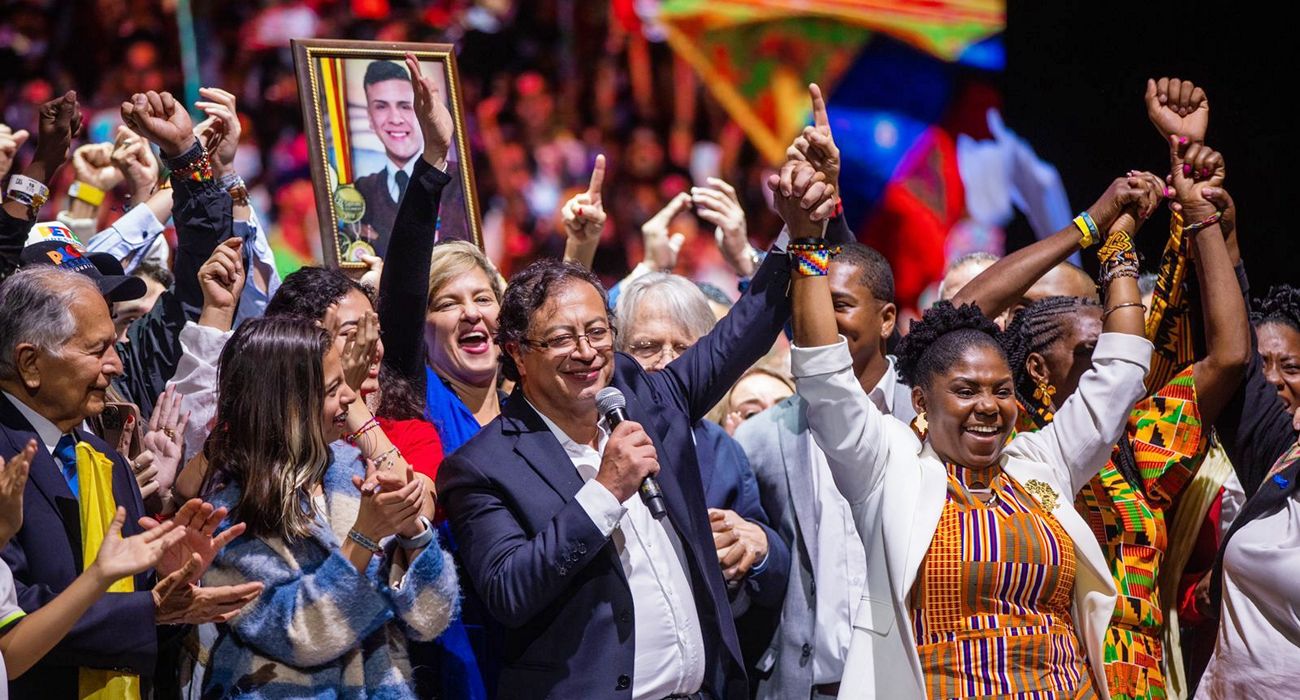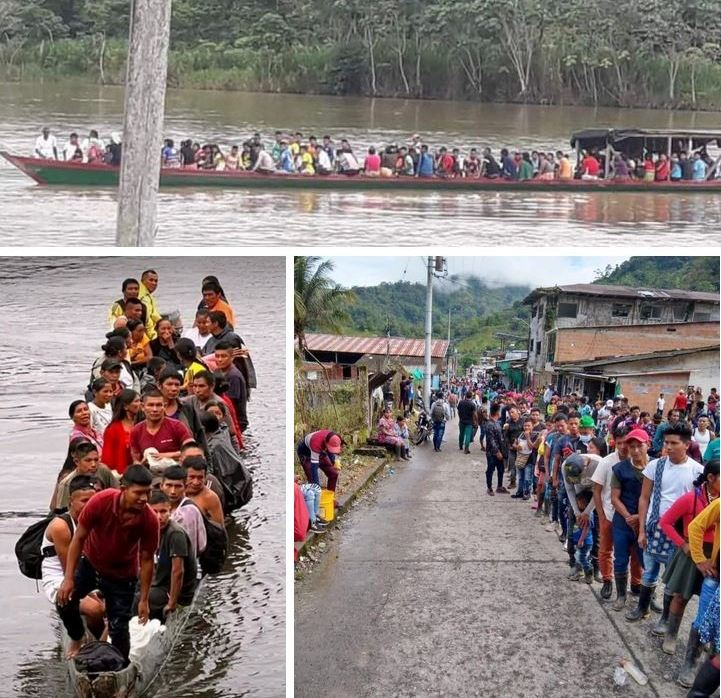In the News July 13
Historic Electoral Victory in Colombia Buoys Hope for Peace
Congratulations to the Colombian People!

Colombians who over and over again have had their hopes for peace and an end to over 70 years of war dashed are today expressing optimism for the future. They are celebrating the historic victory they achieved on June 19 by electing the candidates of the Historic Pact coalition, Gustavo Petro and Francia Márquez, as the country’s new president and vice president.
A central plank of the Historic Pact program is a call for the full implementation of the 2016 Peace Agreement between the Colombian state and the former Revolutionary Armed Forces of Colombia (FARC). Outgoing president Iván Duque did everything possible to sabotage the agreement over the past four years, leading to a resurgence of the dirty war with death squads assassinating social leaders and former FARC members with impunity, virtually on a daily basis.
The political parties and movements that came together to form the Historic Pact coalition, which garnered the support of others going into the second round of the election, include Colombia Humana (Human Colombia), Unidad Popular (Popular Unity), Colombian Communist Party, Polo Democratico Alternativo (Alternative Democratic Pole), Alianza Democratica Amplia (Broad Democratic Alliance), Movimiento Alternativo Indigena y Social (Alternative Indigenous and Social Movement).
Petro and Márquez obtained 50.4 per cent of the valid votes. They defeated the “outsider” candidate, real estate magnate Rodolfo Hernández — who got 47.3 per cent — around whom all the oligarchic forces rallied after their traditional parties failed to make it to the second round. Voter turnout was 58 per cent, higher than for any Colombian election in decades. The National Registry Office informed that greater participation by young and first time voters contributed to the decrease in abstentions.

On election night, Gustavo Petro attributed the Historic Pact’s decisive win to “the tide of women and youth” who took to the polls. It was subsequently shown that Indigenous and Afro-Colombian people in poor rural and coastal communities, which Vice President-elect Francia Márquez called “forgotten” parts of the country, came out as never before to vote and also made a difference.
Petro and Márquez addressed their jubilant supporters at a rally in Bogotá on election night. Márquez spoke first, thanking all those who had contributed to the victory. She made special mention of all those she said had given their lives over so many years and forged the path, sowing the seeds of resistance and hope for the prospects that had now opened up.
She addressed herself to the working people of the country, counting herself among them. Márquez said they had made a very important advance in achieving, for the first time in 214 years, a government “of the people, a popular government, a government of those with callouses on their hands, of ordinary people — a government of ‘the nobodies’ of Colombia.”
Márquez has led important fights since she was a teenager against mining companies’ contamination of the rivers in the mining community where she grew up, in the Department of Cauca in Colombia’s Pacific region. She worked there from the time she was 13 years old, panning for gold nuggets to help pay for her and her siblings’ schooling. Paramilitary death threats related to her environmental and human rights activism eventually forced her to abandon her home.
In Cali, as a young single mother, she worked as a domestic and put herself through university, earning a law degree in 2020. Now, as the country’s first ever Afro-Colombian vice president she will also head up a new Ministry of Equality aimed in particular at instituting practical measures to end the longstanding exclusion of the country’s Afro-descendant and Indigenous populations.
Petro, a senator who contested the presidency twice before, said in his speech on election night that the political climate “of confrontation literally to the death,” which has prevailed over the last century, cannot continue. “There must be no more massacres, no more of governments assassinating the country’s youth, no more children being deprived of food.” His vision for Colombia, he said, is that it become a “world power of life,” centred around peace, and social and environmental justice.
Instead of using power to destroy its opponents through political or legal persecution, Petro said his government would respect and welcome them to engage in dialogue about the country’s problems. He has been meeting with representatives of political parties and groupings as well as political personalities of different stripes who have expressed interest in being part of his proposed Grand National Agreement to diminish the polarization that has long characterized Colombian society and take the country forward in a new way.
Different political forces have shown a willingness to participate, including those with seats in the Congress who have said that they will work with the new government rather than declare themselves in opposition or independent. There is hope that the Congress, in which no party or coalition holds a majority, will not be used to impede the reforms proposed by the new government.
In addition to its commitment to end the armed internal conflict and achieve peace and reconciliation among Colombians, Petro said his government would work to make Colombia a leader in combating climate change. He said it would also provide pensions for all and introduce other urgently needed economic, social and structural reforms aimed at mitigating the gross inequality, lack of protection and multiple insecurities the people face.
With respect to international relations, the Historic Pact government plans to work with the Venezuelan government to fully reopen border crossings and restore normal diplomatic and commercial relations. It will also join with others in the region to advance Latin American integration, which Petro says needs to be taken up “more decisively” at this time.
In his election night speech, Petro said that the time is now to propose a dialogue in the Americas from which no peoples or nations are excluded, but that embraces all the diversity that is America. This is a repudiation of U.S. president Joe Biden’s position, which came under fire at the recent failed Summit of the Americas he hosted, to which Venezuela, Cuba and Nicaragua were not invited, and which consequently several Latin American and Caribbean leaders boycotted.
The Colombian people are to be congratulated for breaking the cycle that for over two centuries has seen only governments of the foreign-backed oligarchy permitted to come to power. This has had disastrous consequences for the country and the people, whose struggles for peace, freedom and democracy have been repeatedly drowned in blood. A testament to this is the finding of the recently released final report of the Commission for Clarification of the Truth, Coexistence and Non-Repetition that between 1958 and 2016 the country’s internal war left 450,664 Colombians dead and 8 million displaced.
The Communist Party of Canada (Marxist-Leninist) and the Canadian people can be counted on to continue to stand with the Colombian people. With the election over, the Colombian people and their new government now take on the even bigger challenge of bringing about the profound changes needed so that peace, reconciliation and social justice are no longer just an aspiration but become the reality in a new Colombia of the people’s own making.
Colombians turn out in large numbers to vote in Presidential election, June 19, 2022
TML Daily, posted July 13, 2022.

|

|


